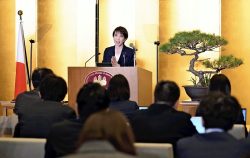Okinawa 50 years since return: Issues hindering self-reliance 1 / Child poverty in Japan’s southernmost prefecture a difficult cycle to break
The Yomiuri Shimbun
14:31 JST, May 2, 2022
Since reverting to Japan on May 15, 1972, Okinawa has fashioned itself into a major tourist area, hand-in-hand with infrastructure development. However, various issues remain outstanding, such as the prefecture’s economic independence and residents’ standard of living. This series explores such topics and the efforts being taken to address related problems.
A teenage girl attending a part-time high school in Okinawa Prefecture has more than five siblings. Her mother — who first became pregnant during her teens — had a succession of boyfriends. The girl, who never met her father, lived with her grandmother. The girl’s mother and grandmother both lived off welfare payments.
The girl’s older sister — five years her senior — had two children in her teens and left them with their mother. The girl had been called back to her mother’s home to take care of the two small children since she was a sixth-grader.
Last year, suffering from physical and mental stress, the girl told her high school teachers and other adults that she was going through a difficult time. She subsequently was placed in Kodomo Shelter Okinawa, a facility for children run by a nonprofit organization.
Since opening in 2016, the shelter has taken in about 90 children affected by poverty, abuse and other issues. The girl spent about two months at the shelter and now lives alone in a flat. At the flat’s entrance, she displays a photo of her nephew and niece whom she had been taking care of. Despite being concerned about them, the girl said, “I’m determined not to see them until I can stand on my own two feet.”
The Child Welfare Law went into effect shortly after the end of World War II on mainland Japan. Okinawa, however, remained under U.S. rule for 27 years and lagged in establishing a support system for struggling families, such as by setting up dormitories for mothers and children.
In the absence of “public help” by the administrative authorities, the spirit of yuimaru — meaning mutual support among family members and communities in the Okinawan dialect — played an important role in providing support to affected families.
When children did not have enough to eat, women in the neighborhood would feed them. Community centers often served as childcare facilities, offering children somewhere to stay.
In the last 50 years, however, urbanization in Okinawa has gradually weakened community ties. “Child poverty has become more conspicuous with the waning of yuimaru,” said Sachiko Arakaki, former director of the Okinawa prefectural government’s welfare and health division.
According to a 2016 prefectural government report, the child poverty rate, which reflects the percentage of children living in households with an income less than half the standard level, is about 30% — roughly double the national average.
Since 1972, Okinawans’ per capita income has — for the most part — remained the lowest in the nation. In 2020, the average monthly salary in Okinawa stood at about ¥220,000, around 20% less than the national average.
The percentage of teenage mothers in Okinawa is about 2.4 times higher than the national average and the divorce rate is the highest among Japan’s 47 prefectures. Young mothers and the high number of single-mother families are among the factors that underlie the poverty cycle, according to the prefectural government’s child and future policy department. To tackle these issues, the public and private sectors are working together to try to rebuild yuimaru-based support.
In late March, about 60 children visited a children’s center in Uruma, Okinawa Prefecture, where they enjoyed boxed lunches containing hamburger steaks and stair-fried vegetables. The center served as a cafeteria, providing lunches during the spring vacation made by women volunteers from the local community.
“I come here all the time. I don’t like carrots, but I try my best to eat them.” said an 8-year-old second-grade schoolgirl with a smile.
“Some kids come here without having had breakfast,” said Chiaki Nakamura, the center’s director. “It’s also important to prevent youngsters from eating alone at home.”
The central government earmarked the six-year-period from fiscal 2016 to 2021 to effect sweeping measures aimed at tackling child poverty in Okinawa. As part of the measures, subsidies were provided to children’s cafeterias — these subsidies have continued into fiscal 2022.
To help single mothers find employment, the prefectural government has since fiscal 2017 been providing free courses that lead to a third-grade bookkeeping qualification certificate. The project’s funds are drawn from the central government’s budget to support Okinawa’s development.
To cut the cycle of poverty, related entities must make long-lasting efforts.
Most Read
Popular articles in the past 24 hours
-

Milano Cortina 2026: Figure Skaters Riku Miura, Ryuichi Kihara Pa...
-

Ruling Coalition Calls for Opposition Participation in ‘National ...
-

Japan’s Updated ‘Free and Open Indo-Pacific’ Initiative to Streng...
-

Takaichi Chats with Tunku Tunku, Interactive Mascot for Internati...
-

Myaku-Myaku Fan Event Held in Osaka; ‘Its Butt is so Cute!’ Says ...
-

“The Tale of Genji” Back-Translation Project Led to Touching Enco...
-

Japan’s Nikkei Stock Average Slips as Post-Earnings and Election ...
-

Milano Cortina 2026: Riku Miura and Ryuichi Kihara Win Japan̵...
Popular articles in the past week
-

Videos Plagiarized, Reposted with False Subtitles Claiming ‘Ryuky...
-

Woman with No Overseas Travel History Infected with Measles in Na...
-

Milano Cortina 2026: Kokomo Murase Comes Out on Top After Overcom...
-

CRA Leadership Election Will Center on Party Rebuilding; Lower Ho...
-

Tokyo’s New Record-Breaking Fountain Named ‘Tokyo Aqua Symphony’
-

Crime in Japan Ticks Up for 4th Straight Year
-

Milano Cortina 2026: Figure Skaters Riku Miura, Ryuichi Kihara Pa...
-

Japanese Constitutional Revision Debate Expected to be Revived Af...
Popular articles in the past month
-

Japan Institute to Use Domestic Commercial Optical Lattice Clock ...
-

Israeli Ambassador to Japan Speaks about Japan’s Role in the Reco...
-

Man Infected with Measles May Have Come in Contact with Many Peop...
-

China Eyes Rare Earth Foothold in Malaysia to Maintain Dominance,...
-

Prudential Life Insurance Plans to Fully Compensate for Damages C...
-

Woman with Measles Visited Hospital in Tokyo Multiple Times Befor...
-

Australian Woman Dies After Mishap on Ski Lift in Nagano Prefectu...
-

Foreign Snowboarder in Serious Condition After Hanging in Midair ...
Top Articles in Society
-

Man Infected with Measles May Have Come in Contact with Many People in Tokyo, Went to Store, Restaurant Around When Symptoms Emerged
-

Woman with Measles Visited Hospital in Tokyo Multiple Times Before Being Diagnosed with Disease
-

Australian Woman Dies After Mishap on Ski Lift in Nagano Prefecture
-

Foreign Snowboarder in Serious Condition After Hanging in Midair from Chairlift in Nagano Prefecture
-

Record-Breaking Snow Cripples Public Transport in Hokkaido; 7,000 People Stay Overnight at New Chitose Airport
JN ACCESS RANKING
-

Japan Institute to Use Domestic Commercial Optical Lattice Clock to Set Japan Standard Time
-

Israeli Ambassador to Japan Speaks about Japan’s Role in the Reconstruction of Gaza
-

Man Infected with Measles May Have Come in Contact with Many People in Tokyo, Went to Store, Restaurant Around When Symptoms Emerged
-

Prudential Life Insurance Plans to Fully Compensate for Damages Caused by Fraudulent Actions Without Waiting for Third-Party Committee Review
-

Woman with Measles Visited Hospital in Tokyo Multiple Times Before Being Diagnosed with Disease








